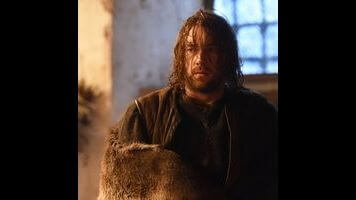At least “The Bernadette Maneuver/Cynllwyn Bernadette” has a clear narrative structure, which is more than can be said for the majority of this season. The main plot of the episode is simple: Chamberlain Corbett, along with Wilkin, Toran, the Reeve, and a number of other men, are on the hunt for Piers Gaveston, hoping to turn him over to the Earl of Warwick in exchange for a sum of silver. Of course there’s the B-plot of the Baroness attempting to get Jessa to remember that Wilkin isn’t Gawain Maddox, and C-plot, which sees the Priest and Luca held captive because of Annora, but there’s not a lot to those side stories. This is firmly about the hunt for Gaveston, and such focus deserves to be credited because of how rare it is on The Bastard Executioner.
That doesn’t meant this is an exemplary episode of television, but rather an improvement on just about every other episode this season, and certainly last week’s debacle. There’s urgency to the plot to capture Gaveston and secure the safety of Ventrishire that suits the show, as so much of The Bastard Executioner has been dull and uninspired. Plus, the search for the Frenchman allows the show to loosen up a little and get away from its self-serious tone. The best stuff in tonight’s episode sees the cast with more personality than they’ve shown before. There’s genuine comedy in the way Wilkin and Ash use a goat, suitably named Bernadette, to distract the men at the Deddington Monastery where they expect Gaveston is being kept. Add that to the more tender scenes between the Baroness and Jessa and suddenly the show has a much more natural feel to it.
Still, despite the more natural feel to some of those exchanges, the same issues that have plagued this season pop up again and again throughout “The Bernadette Maneuver/Cynllwyn Bernadette.” The biggest problem is that, with this being the penultimate episode of the season, there are many conflicts, both physical and emotional, coming to a head, but none of them feel particularly consequential or meaningful because the building blocks haven’t been there all season. Take, for instance, the end of the episode, where Wilkin reflects on the fact that he’s taken this role of executioner and has therefore participated in “unforgiveable sins.” It makes sense that Wilkin would eventually reckon with the state of his soul, but The Bastard Executioner has spent so much time reveling in its violence without contemplating the consequences that Wilkin’s sudden turn is jarring and rings hollow.
It wasn’t that long ago that he sentenced an innocent man to a grisly death and then shrugged it off because it kept him and the Baroness together, and that’s only one of his sins. Yet the show treated that death as insignificant, as just another in a long line of bodies. Thus, when “The Bernadette Maneuver/Cynllwyn Bernadette” puts forward the notion that Wilkin is beginning to feel remorse and question his allegiance to both Annora and Milus, just as he’s ordered to torture another innocent, disposable young woman, there’s no real weight behind it.
At one point Wilkin’s journey was about revenge. He took on the role of executioner to get closer to his enemies, but also because of a vision. Such motivations have been lost along the way though, and the lack of character development throughout the season means that the episode’s existential revelations don’t hold any power. It’s hard to relate to Wilkin’s supposed conflicted loyalty when he’s doing everything Corbett tells him too without hesitation. “The Bernadette Maneuver/Cynllwyn Bernadette” does try to shift Wilkin’s motivation by suggesting that he’s no longer looking for revenge, but rather looking to protect the Baroness and a potential future with her, but again, it’s a storyline that’s hardly been explored all season long, resulting in the romance feeling contrived rather than earned.
Ultimately, “The Bernadette Maneuver/Cynllwyn Bernadette” boasts a clear plot structure that makes it more watchable than most previous installments, but still presents a shoddy relationship with consistency and storytelling. Wilkin’s plot for revenge is briefly brought up by Corbett only to be dropped from the discussion just seconds later. Jessa’s story of mental illness invoked by trauma is glossed over and resolved (it seems) with relative ease; some tough love from the Baroness took care of that. And Milus gets everything he wants as he threatens one character after another with sexual violence. These conflicts never feel substantial because of the haphazard character work and sluggish pacing. Even when the show stumbles upon intriguing storytelling, as it does with the parallel between Wilkin and Piers’ motivations and identity crises, it never stops to tease out the nuances contained within. Instead, it’s off with his head and on to the next sluggish plot.
Stray observations
- The camera lingers on the mutilated corpse of the other French half-sister, because it wouldn’t be an episode of The Bastard Executioner without such a shot!
- Isn’t it great how Wilkin doesn’t really torture that woman, and yet the show still gets to exploitatively revel in the thought of it anyway?
- I’m so tired of Corbett’s villainy only manifesting itself in cock-centric threats and actions, especially considering the explanation for it all is, “well, he was sexually abused as a child.”
- So, the implication at the end is that Wilkin is Annora’s son? It just happened so quickly, and Wilkin barely responded, that I wasn’t sure.

 Keep scrolling for more great stories.
Keep scrolling for more great stories.
